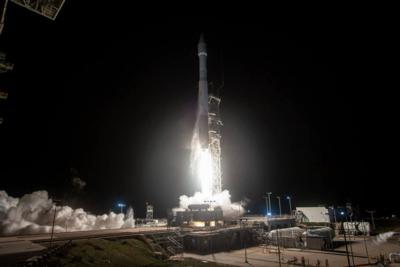Tue, Nov 15, 2022
Joint Polar Satellite System and Inflatable Decelerator Successfully Deployed
A United Launch Alliance (ULA) Atlas V rocket carrying equipment for the NOAA and NASA test gear launched from Space Launch Complex-3 at Vandenberg Space Force Base on November 10.

The launch took up the NOAA's Joint Polar Satellite System or JPSS-2. The weather analysis satellite has already entered its initial operational mode and extended its solar arrays, beginning normal activity. The JPSS-2 will circle the globe 14 times a day at an altitude of 512 miles, adding another source to the forecaster's Polar sources. Already orbiting the poles for a similar mission are JPSS-2's now-coworkers, the Suomi National Polar-orbiting Partnership (Suomi NPP) and NOAA-20 satellites.
Along for the ride was an additional piece of kit for NASA testing, the Low-Earth Orbit Flight Test of an Inflatable Decelerator, or LOFTID. The inflatable heat shield technology that could one day help land astronauts on Mars. The "aeroshell", as the system is called, could one day enable heavier payloads for difficult environments by their increased drag and low footprint when deflated. The LOFTID team will be able to review detail from the demo once recovered to decide where development should proceed.
“NOAA is an important partner for NASA in providing essential data about climate change, weather prediction, and environmental modeling for the benefit of citizens both in the U.S. and around the world,” said NASA Associate Administrator Bob Cabana. “Our Launch Services Program has successfully launched its 100th primary mission, and on this same flight enabled us to test a new technology for atmospheric re-entry with the LOFTID demonstration.”
“Exploring the unknowns of our planet to the benefit of our fellow citizens is in our DNA,” said Thomas Zurbuchen, associate administrator for NASA’s Science Mission Directorate. “The data that JPSS-2 will send back to our NASA and NOAA scientists on the ground will be critical in saving lives both on Earth and in space.”
“As partners, NOAA and NASA have successfully launched more than 60 satellite missions that have significantly improved weather forecasts, solar monitoring, and climate prediction,” said Steve Volz, director of NOAA’s Satellite and Information Service. “Launching JPSS-2 is just the latest example of what our collective agencies can achieve for the benefit of the Nation and the world at large.”
More News
Also: New Lakeland Fly-in!, Gleim's DPE, MOSAIC! Nearly three-quarters of a century in the making, EAA is excited about the future… especially with the potential of a MOSAIC>[...]
Estimated (EST) -When used in NOTAMs “EST” is a contraction that is used by the issuing authority only when the condition is expected to return to service prior to the >[...]
Aero Linx: Regional Airline Association (RAA) Regional airlines provide critical links connecting communities throughout North America to the national and international air transpo>[...]
The Airplane Broke Up In Flight And Descended To The Ground. The Debris Path Extended For About 1,435 Ft. Analysis: The pilot, who was the owner and builder of the experimental, am>[...]
From 2015 (YouTube version): History Comes Alive Thanks to A Magnificent CAF Effort The story of the Douglas C-47 named, “That’s all Brother,” is fascinating from>[...]
 Airborne 07.21.25: Nighthawk!, Hartzell Expands, Deltahawk 350HP!
Airborne 07.21.25: Nighthawk!, Hartzell Expands, Deltahawk 350HP! ANN's Daily Aero-Term (07.27.25): Estimated (EST)
ANN's Daily Aero-Term (07.27.25): Estimated (EST) ANN's Daily Aero-Linx (07.27.25)
ANN's Daily Aero-Linx (07.27.25) NTSB Final Report: Luce Buttercup
NTSB Final Report: Luce Buttercup Classic Aero-TV: 'That's All Brother'-Restoring a True Piece of Military History
Classic Aero-TV: 'That's All Brother'-Restoring a True Piece of Military History



